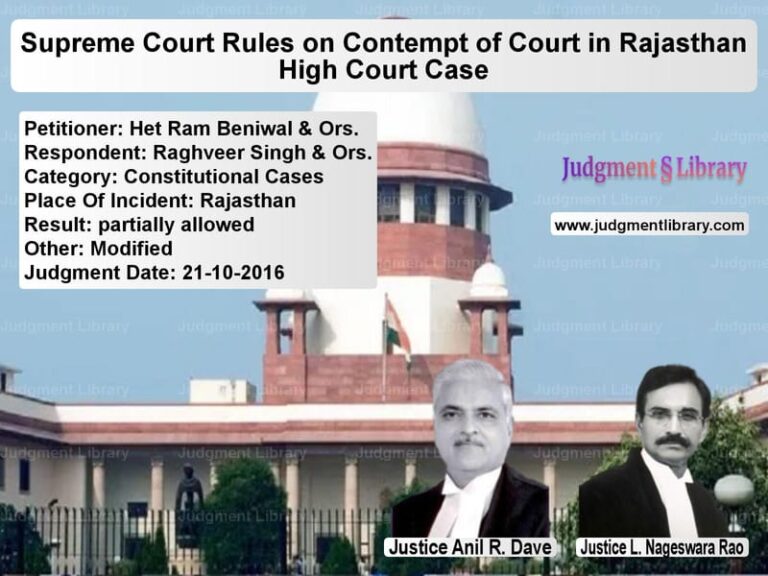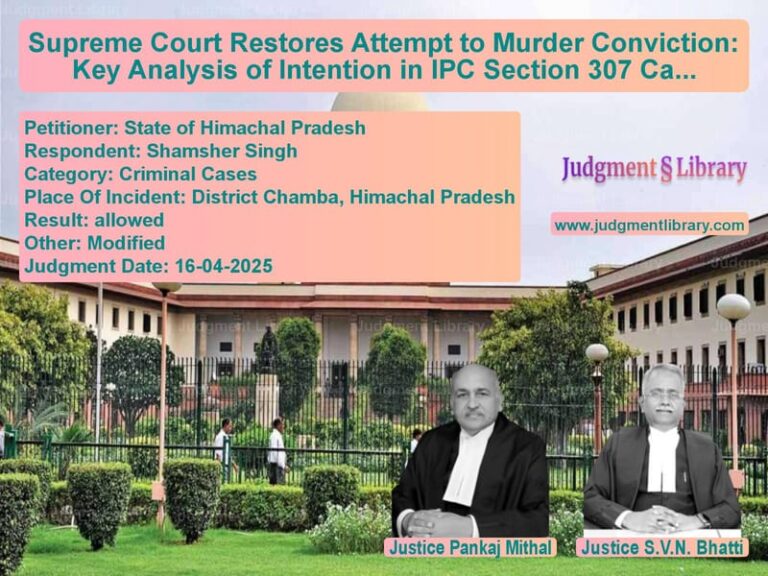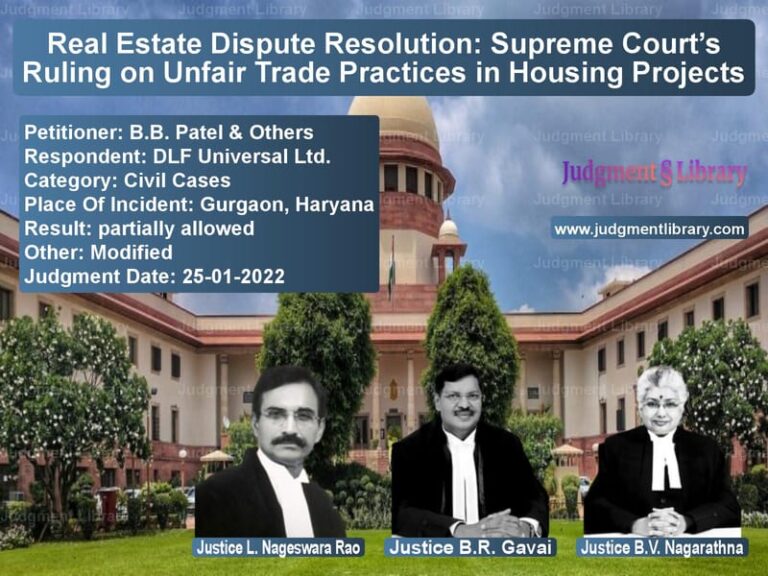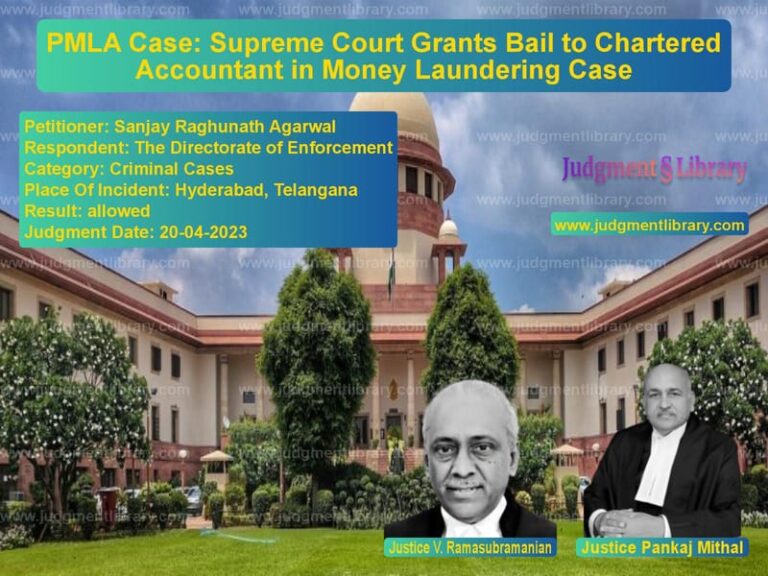Supreme Court Upholds Conviction Under Section 498A IPC in Dowry Harassment Case
The Supreme Court of India, in the case of Surendran v. State of Kerala, delivered a landmark judgment on May 13, 2022, reinforcing the legal framework against dowry harassment under Section 498A of the Indian Penal Code (IPC). The Court upheld the conviction of the appellant for cruelty towards his wife while setting aside the charge under Section 304B IPC (dowry death). This judgment clarifies the evidentiary scope of statements made by deceased victims and the applicability of Section 32(1) of the Indian Evidence Act.
Background of the Case
The case concerns the tragic suicide of a woman who was allegedly harassed for dowry soon after her marriage on April 9, 1995. The prosecution argued that persistent harassment by her husband, Surendran, and his family led to two suicide attempts—the first by consuming poison and the second, which proved fatal, by hanging on October 21, 1996.
Initially, the trial court convicted the appellant and his family under Sections 304B and 498A IPC. However, upon appeal, the High Court of Kerala acquitted the accused under Section 304B IPC while maintaining the conviction under Section 498A IPC and modifying the sentence to one year of rigorous imprisonment.
Surendran challenged this verdict before the Supreme Court, arguing that the deceased’s statements were inadmissible as evidence under Section 32(1) of the Indian Evidence Act.
Arguments by the Appellant
The appellant’s counsel raised two key arguments:
- Statements made by the deceased, including the suicide note and testimonies of witnesses, should not be admissible under Section 32(1) of the Indian Evidence Act since he was acquitted of the dowry death charge under Section 304B IPC.
- The mother of the deceased (PW-3) was an interested witness, and her testimony was contradictory and unreliable.
Arguments by the Respondent (State of Kerala)
The prosecution countered the appellant’s arguments, stating:
- There were concurrent findings of fact by multiple courts, confirming that the appellant had subjected the deceased to mental and physical harassment.
- The testimony of PW-3 was corroborated by documentary evidence, including medical records from the deceased’s prior suicide attempt.
- The evidence was sufficient to sustain the conviction under Section 498A IPC, even if the charge under Section 304B IPC was not proven beyond a reasonable doubt.
Supreme Court’s Observations and Ruling
The Supreme Court carefully examined the provisions of Section 32(1) of the Indian Evidence Act, which deals with the admissibility of statements made by deceased persons when the cause of their death is in question.
The Court noted:
“The phrase ‘circumstances of the transaction’ under Section 32(1) is broader than merely cases of murder or suicide. If the prosecution establishes that the cause of death is connected to the alleged cruelty, statements made by the deceased before death can be relied upon.”
The Court rejected the appellant’s argument that acquittal under Section 304B IPC precludes reliance on the deceased’s statements for convicting under Section 498A IPC. It emphasized:
“The test for admissibility under Section 32(1) is not limited to cases where an accused is convicted of homicide or suicide-related offenses. The crucial factor is whether the cause of death was questioned in the trial.”
The Supreme Court also addressed the credibility of PW-3’s testimony, ruling that:
“The evidence of an interested witness cannot be discarded solely due to their relationship with the victim. Courts must scrutinize such evidence carefully, but a conviction can be based on it if found reliable.”
Based on these findings, the Supreme Court upheld the conviction under Section 498A IPC, affirming the sentence of one year of rigorous imprisonment.
Key Takeaways from the Judgment
- Acquittal under Section 304B IPC does not automatically exclude the deceased’s statements from being considered under Section 32(1) of the Indian Evidence Act.
- The phrase ‘circumstances of the transaction’ under Section 32(1) has a broad interpretation, covering statements related to cruelty and harassment leading to death.
- Testimony from an interested witness, such as a close relative, can be relied upon if it is corroborated and found credible.
- Section 498A IPC serves as an independent charge and does not necessarily require proof of dowry death for a conviction.
Conclusion
The Supreme Court’s ruling in Surendran v. State of Kerala reinforces the legislative intent behind Section 498A IPC, ensuring justice for victims of dowry harassment. The judgment clarifies that statements of deceased victims remain admissible under Section 32(1) of the Indian Evidence Act, even if the accused is acquitted of charges directly related to the victim’s death.
By affirming the conviction under Section 498A IPC, the Court has sent a strong message against domestic abuse and dowry harassment, upholding the fundamental rights of married women across India.
Petitioner Name: Surendran.Respondent Name: State of Kerala.Judgment By: Justice N.V. Ramana, Justice A.S. Bopanna, Justice Hima Kohli.Place Of Incident: Kerala.Judgment Date: 13-05-2022.
Don’t miss out on the full details! Download the complete judgment in PDF format below and gain valuable insights instantly!
Download Judgment: surendran-vs-state-of-kerala-supreme-court-of-india-judgment-dated-13-05-2022.pdf
Directly Download Judgment: Directly download this Judgment
See all petitions in Dowry Cases
See all petitions in Domestic Violence
See all petitions in Attempt to Murder Cases
See all petitions in Judgment by N.V. Ramana
See all petitions in Judgment by A. S. Bopanna
See all petitions in Judgment by Hima Kohli
See all petitions in dismissed
See all petitions in supreme court of India judgments May 2022
See all petitions in 2022 judgments
See all posts in Criminal Cases Category
See all allowed petitions in Criminal Cases Category
See all Dismissed petitions in Criminal Cases Category
See all partially allowed petitions in Criminal Cases Category







